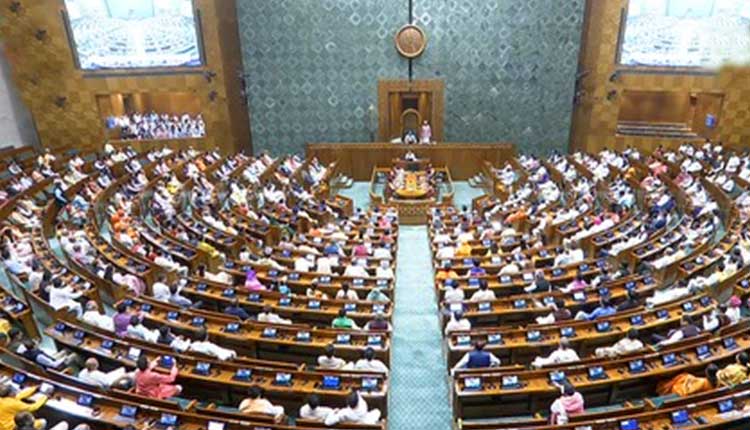New Delhi: The Centre on Tuesday introduced in Lok Sabha the ‘Nari Shakti Vandan Adhiniyam 2023’ or the Women Reservation Bill, which seeks to guarantee 33 per cent quota for women in the Lok Sabha and state Assemblies.
It was introduced as the 128th Constitutional Amendment Bill by Law Minister Arjun Ram Meghwal, and became the first Bill to be introduced in the new Parliament building.
The Bill mandates the reservation of seats for women in the Lok Sabha. As per the amendment, one-third of the total number of seats in the Lok Sabha will be reserved for women.
This move is aimed to ensure greater representation of women in the national legislature.
The proposed Bill allows for the rotation of reserved seats for women in the Lok Sabha, State Assemblies, and the Delhi Assembly after each subsequent delimitation exercise, as determined by Parliament.
It extends its provisions to the Legislative Assembly of the National Capital Territory of Delhi.
“One-third of the seats reserved for Scheduled Castes in the Delhi Assembly are also reserved for women…One-third of the total number of seats filled by direct election in the Delhi Assembly (including those reserved for women belonging to Scheduled Castes) are also reserved for women,” says the Bill.
The amendment applies to the legislative Assemblies of all Indian states. Similar to the Lok Sabha and Delhi Assembly provisions, one-third of the total seats reserved under the applicable clause shall be reserved for women, including those from Scheduled Castes and Scheduled Tribes, it further said.
The Bill specifies that the provisions related to the reservation of seats for women in the Lok Sabha, State Assemblies, and the Delhi Assembly will come into effect after a delimitation exercise is conducted.
“Notwithstanding anything in the foregoing provision of this Part or Part VIII, the provisions of the Constitution relating to the reservation of seats for women in the House of the People, the Legislative Assembly of a State and the Legislative Assembly of the National Capital Territory of Delhi shall come into effect after an exercise of delimitation is undertaken for this purpose after the relevant figures for the first census taken after commencement of the Constitution (One Hundred and Twenty-eighth Amendment) Act, 2023 have been published and shall cease to have effect on the expiration of a period of fifteen years from such commencement,” the statement of objective of the Bill says.
Earlier there was a war of words between leader of the Congress in Lok Sabha Adhir Ranjan Chowdhury and treasury benches over the Bill.
Chowdhury while delivering his first speech in the new Parliament building, soon after Prime Minister Narendra Modi urged upon all members to support the Bill, which empowers women, said that it always got stuck in one House or the other.
“However, the Bill which was brought during Manmohan Singh’s time and was passed in Rajya Sabha, is still alive,” Chowdhury claimed.
As he said this, the treasury benches rose in protests and Home Minister Amit Shah said that the Bill which was passed in the Rajya Sabha got lapsed with the 15th Lok Sabha.
“If he has any proof of the Bill being still alive, then Adhir ji should give some evidence or his remarks should be expunged,” Shah said.
Speaker Om Birla soon adjourned the House for the day after the introduction of the Bill.
(IANS)















